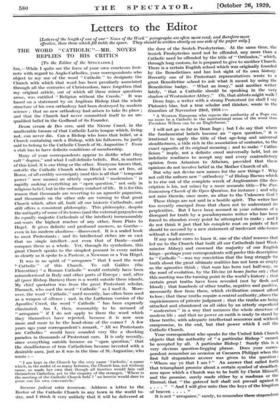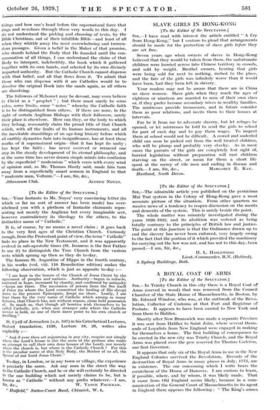Letters to the Editor
[Letters of the length of one of our" .News of the Week" paragraphs are often more read, and therefore more effective, than those which fill treble the space. They should be written dearly on one side of the paper only.]
THE WORD "CATHOLIC "—MR. NOYES REPLIES TO HIS CRITICS
[To the Editor of the SPECTATOR.] SIR,—While I quite see the force of your own courteous foot- note with regard to Anglo-Catholics, your correspondents who object to my use of the word " Catholic " to designate the Church with which that word has been peculiarly associated through all the centuries of Christendom, have forgotten that my original article, out of which all these minor questions arose, was entitled "Religion without the Creeds." It was based on a statement by an Anglican Bishop that the whole structure of his own orthodoxy had been destroyed by modern science ; that no new. orthodoxy .had arisen to take its place ; and that the Church had never committed itself to an un- qualified belief in the Godhead of its Founder.
Deum verum de Deo vero, said the Nicene Creed, in the unalterable bronze of that Catholic Latin tongue which, living not, can never die. Can a Bishop who loses that belief, or a Church containing such a Bishop, with his followers, be justly said to belong to the Catholic Church of St. Augustine ? Even a club has to have definite conditions of membership.
Many of your correspondents appear to dislike what they call" dogma," and what I call definite beliefs. But, in matters of this kind, it is one thing or the other. Everyone knows that, outside the Catholic Church whose Head is now set free, at Rome, of all earthly sovereignty (and this is all that "temporal power" now means) an utterly superficial " modernism " is rapidly making everything an "open question," not only in religious belief, but in the ordinary conduct of life. It is for this reason that thousands are reverting to an agnostic paganism, and thousands on the other side are turning to that great Church which, after all, built all our historic Cathedrals, and still offers a consistent philosophy. This philosophy, despite the antiquity of some of its terms (and the external gargoyles on its equally majestic Cathedrals of the intellect) immeasurably out-soars the highest reaches of any other,- from Plato to Hegel. It gives definite and profound answers, as Goethe- even in his modern aloofness—discovered. It is a sealed book to most Protestants ; and its intellectual riches are so vast that no single intellect—not even that of Dante—could compass them as a whole. Yet, through its symbolism, this great Church speaks to the simplest peasant in every nation as clearly as it spoke to a Pasteur, a Newman or a Von Hiigel.
It was in no spirit of " arrogance " that I used the word
" Catholic " of this Church. To call Galileo (the Florentine) "a Roman Catholic" would certainly have been misunderstood in Italy and other parts of Europe ; and, after all (pace Bishop Barnes) there is a world outside these islands. My chief quotation was from the great Protestant scholar, Harnack, who used the word " Catholic " as I used it. More- over, the word "Catholic," until recently, has often been used as a weapon of offence ; and, 'in the Lutheran version of the Apostles' Creed, the word" Catholic " has been expressly eliminated. Am I, then, reasonably to be accused of "arrogance" if I do not apply to them the word which they themselves have rejected, because it is now seen more and more to be the head-stone of the corner ? A few
years ago your correspondent's remark, "All we Protestants are Catholics" would have sounded very like a shocking paradox in thousands of Protestant ears. It is only recently, since everything outside became an "open question," that the steadfastness of true Catholicism became invested with a desirable aura, just as it was in the time of St.Augustine, who wrote :—
"I am kept in the Church by the very name 'Catholic,' a name which, in the midst of so many heresies, the Church has, not without cause, so made her own that though all heretics would fain call themselves Catholics, yet to the enquiry of the stranger, 'Where is the meeting of the Catholic Church held I 'no heretic would dare to point out his own conventicle."
Securus judicat orbis terrarum. Address a letter to the Rector of the Catholic Church in any town in the world to- day, and I think it very unlikely that it will be delivered at the door of the Scot.ch Presbyterian., At the same time, the Scotch Presbyterian .need not be offended, any more than a Catholic need be offended by the title of " Orthodox," which, through long custom, he is prepared to give to another Church, There is a certain English school which was originally founded by the Benedictines and has lost sight of its own history. Recently one of its Protestant representatives wrote to a great Benedictine school to ask what it meant by using the Benedictine badge. "What an irony," said another writer lately, "that a Catholic should be speaking in the very shadow of Westminster Abbey." Oh, that abbots might walk !
Dean Inge, a writer with a strong Protestant (or shall I say Platonic) bias, but a true scholar and thinker, wrote in the Guardian of November 23rd, 1916 :—
"A Western European who rejects the authority of a Pope can no more be a Catholic in the institutional sense of the word than President Wilson can be an Englishman."
I will not go so far as Dean Inge ; but I do say that where the fundamental beliefs become an "open question," it is irrational to apply the title of that age-long and universal steadfastness, a title rich in the association of centuries, to the exact opposite of its original meaning ; and to make " Catho- licism " imply, not a definite creed universally held,, but an indefinite readiness to accept any and every contradictory opinion from Arianism to Atheism, provided that these opinions do not involve belief in the Mother Church of all.
But why not devise new names for the new things ? Why not call the unborn new "orthodoxy " of Bishop Barnes which is to rise out of the complete wreck of Anglicanism (the des- cription is his, not mine) by a more accurate title—The Par- liamentary Church of the Open Question, for instance ; and why not raise therein, once more, an altar to the Unknown God ?
These things are not said in a hostile spirit. The writer has too recently emerged from that chaos not to understand its perplexities. But I have been accused in your columns of a disregard for truth by a pseudonymous writer who has been forced to abandon every point he attempted to make ; and I do not think it just that his complete rout on points of fact should be covered by a new statement of irrelevant side-issues without a full answer.
If any reader cares to know it, one of the chief reasons that led me to the Church that built all our Cathedrals (and West- minster Abbey) and crowned the majority of our English kings—perhaps your correspondents will prefer this description to "Catholic "—was my conviction that the long struggle fez truth about the great ultimate realities has not been as empty as the agnostics think ; that man has been met half-way, on the road of evolution, by the Divine (et home foetus est) ; that this meeting was the turning point in the world's history ; that certain great truths have been revealed (not by flesh and
blood) ; that hundreds of other truths, negative and positive, necessarily flow from them, which civilization cannot afford
to lose ; that these truths require a central authority, above the capriciousness of private judgment ; that the truths are being attacked and abandoned on all sides by an utterly superficial " modernism " in a way that menaces the whole structure of modern life ; and that no power on earth is ready to stand by those truths, with adequate intellectual resources and without compromise, to the end, but that power which I call the Catholic Church.
Your correspondent who speaks for the United Irish Church objects that the authority of "a particular Bishop" cannot be accepted by all. A particular Bishop! Surely this is a very obvious question-begging phrase. Does your corres- pondent remember an occasion at Caesarea Philippi when the first full stupendous answer was given to the question : "Whom say ye that I am ? " An answer that called forth that triumphant promise about a certain symbol of steadfast-
ness upon which a Church was to be built by Christ Himself, and the promise, surely made either by a madman or the Eternal, that "the gates of hell shall not prevail against it . . " "And I will give unto thee the keys of the kingdom of heaven . . .
It is not " arrogance," surely, to remember these stupendous
things and bow one's head before the supernatural force that rings and re-echoes through these very words to this day. I
do not understand the picking and choosing of texts, by the Bible Christians, out of their infallible Bible—and least of all when they whittle away the most overwhelming and tremen- dous passages. Given a belief in the Maker of that promise, who stands behind the Body that He founded until the con- summation of all things, I can understand the claim of that Body to interpret, indefectibly, the book which it gathered together with its own hands, and selected by its own divinely imparted authority. But the Catholic Church cannot dispense with that belief, and all that flows from it. To admit that those who can dispense with it are Catholics would be to
dissolve the original Rock into the sands again, as all others are dissolving.
The followers of Mahomet may be devout, may even believe in Christ as a " prophet " ; but there must surely be some rules, some limits, some " notes " whereby the Catholic faith is to be distinguished from others. If there are none, in the sight of certain Anglican Bishops with their followers, surely their place is elsewhere. How can they, or the body to which they belong, reasonably claim the proud title of that Church which, with all the faults of its human instruments, and all the inevitable stumbling,s of an age-long history before which all earthly dynasties fade into insignificance, has at least these marks of it supernatural origin—that it has kept its unity ; has kept the faith ; has never swerved or retraced one step in the steady development of its eternal philosophy, and at the same time has never drawn simple minds into confusion by the superficial " modernism " which veers with every wind
of opinion and, as Mr. Thomas Hardy said, made him turn away from a superficially smart sermon in England to that "moderate man, Voltaire."—! am, Sir, &c.,



















































 Previous page
Previous page